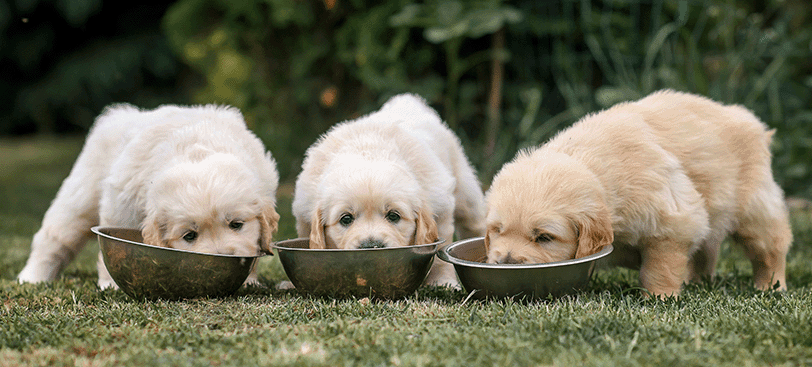
Your puppy’s age will determine what your puppy eats. Until your pup is at least eight weeks old, they will have received everything they need from their mother and the breeder, so it’s important that their nutritional needs are met with a high quality, super premium diet as they get older.
From the age of about eight weeks, depending on their breed, puppies may be fed wet food or a combination of wet and dry. Kibble can be softened with water, for those pups who aren’t quite ready for dry complete food. Compared to smaller and medium breeds, larger breed puppies often have the ability to eat dry food more easily from a younger age and so can be fed a combination of wet and dry food.
Feeding a mostly dry diet to your puppy throughout their whole life will help ensure their teeth stay clean and healthy.
Super Premium Puppy Food
There are many foods available to purchase for your puppy, however the best and healthiest varieties are super premium. Super premium puppy foods benefit your pooch in many ways:
-
Nutrition
The first ingredient in these foods is meat, which will fill your puppy primarily with protein rather than fillers that will leave him hungry much quicker. This will also improve your puppy’s stools, making them firmer and less frequent (meaning no messy ones to clean up!). -
Price
These foods are tailored to your puppy’s needs and are available in many choices, giving you the freedom to choose the most suitable diet to maximize your puppy’s health and growth. While it can be more expensive at the time of purchase than other dog foods, the amount you need to feed your puppy can be significantly less. Super premium foods are concentrated, meaning you can feed less whilst also keeping your pup fuller for longer, making the shelf price comparable to alternative foods. -
Appearance
All of the ingredients in super premium food are functional; every ingredient is there for a reason and benefits your puppy in some way. You will see the quality of your puppy’s diet reflected in their coat and overall health. -
Taste
Another major drawing point is the palatability guarantee that super premium brands carry. This means that no matter what size bag you buy, if your puppy is not keen on the food, you can bring the bag back to your local Perstock store for a full refund or exchange.* Give your puppy at least five days to give the food a red hot go, if he/she is still not crazy about it after this time, re-visit the store and have a chat with a PETstock team member about an alternative option.
*Some conditions apply, chat with a Petstock team member for more details.
How Often Should I Feed My Puppy?
The number of times to feed your puppy per day will depend on their age. The below table provides a general feeding guide:
| Age Range | Feeding Frequency |
|---|---|
| Up to 12 weeks | 3/4 times per day |
| 12 weeks to 6 months | 2/3 times per day |
| 6 months + | 2 times per day |
During your puppy’s first week at home, try and feed the same food they’ve been eating previously while slowly introducing the new food little by little, until your puppy has fully transitioned across. Switching your puppy’s food quickly will most likely cause diarrhoea.
Small and medium breed puppies like Maltese Terriers and Border Collies, are recommended to eat a puppy diet up until they are 12 months old. After this, they may move to an adult diet consistent with their needs. Larger breed puppies like German Shepherds and Great Danes may enjoy a puppy diet until they are about 18 months of age before moving to an adult diet.
After a pup is weaned from their mother, there is no need to give milk. Fresh water is far better and helps with digestion.
Food to Avoiding Feeding Your Puppy
While we all know dogs love a sneaky table scrap, there are certain food that pooches should avoid completely. At a minimum these foods can be dangerous to dogs, however they can be fatal.
- Cooked bones
- Onions
- Grapes
- Sultanas
- Avocado
- Coffee/Tea
- Alcohol
- Chocolate
- Macadamia Nuts
- Artificial Sweeteners (Xylitol)
- BBQ/Cured Meats
Feeding your puppy straight from the dining table should also be avoided, as it can lead to behavioural problems like begging and stealing! Table scraps are also usually high in calories so feeding these to your puppy may promote unwanted weight gain and poor health.
It's important to prepare your pups' environment before they arrive, to ensure everyone is relaxed, calm and happy when you introduce your new pet.